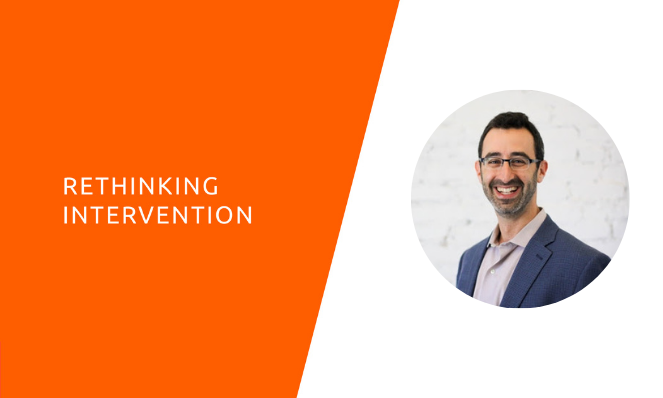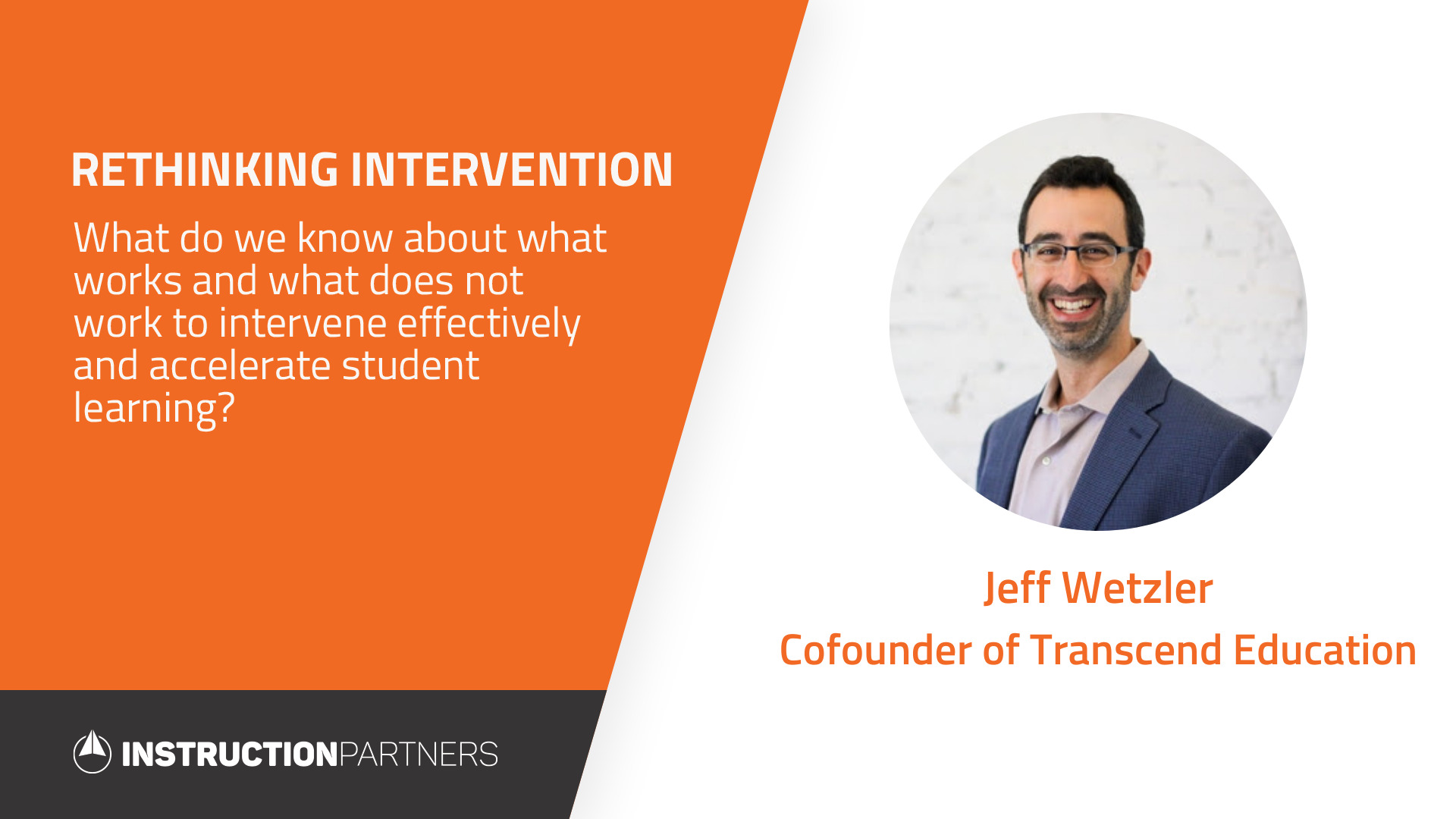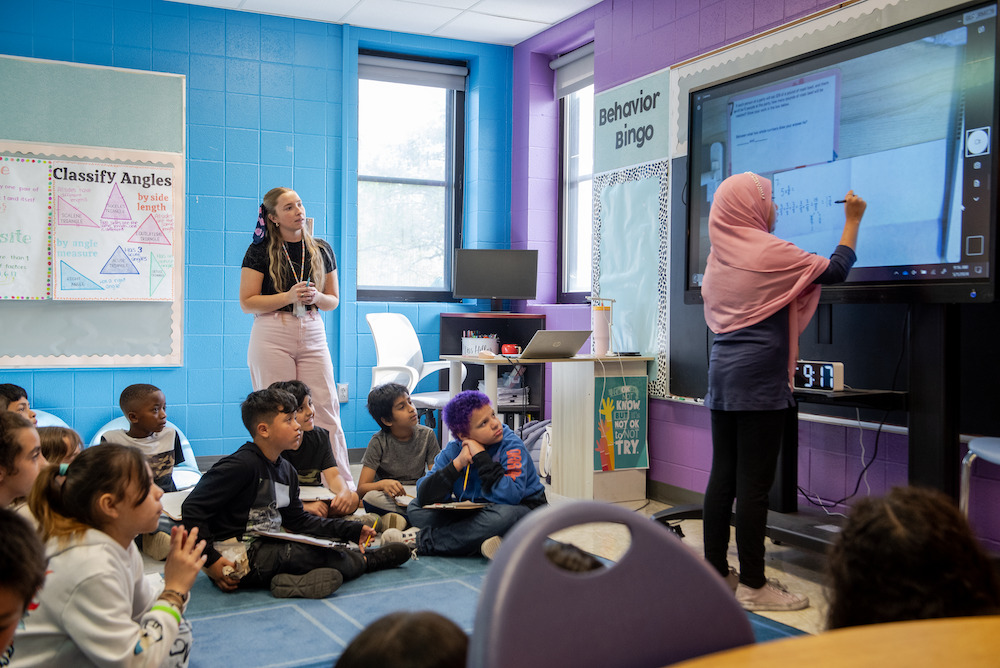
Jeff Wetzler, Transcend Education
Jeff Wetzler, cofounder of Transcend, shares what learning science research can teach us about accelerating student learning. Transcend is a national nonprofit that partners with school and district operators to lead innovative changes to school models.
Listen to the full conversation or read the abridged Q&A below.

EF: I’d love to hear about a personal journey of learning and how that personal experience shapes how you think about what it takes to help students learn.
JW: I’ll talk about my daughter. She is now in sixth grade, but I’ll go back to a moment in time when she was in elementary school. We were having a parent-teacher conference with her teacher, and she wasn’t doing that well in math. She was misunderstanding some of the concepts. At the teacher conference, the teacher said something to the effect of, “She’s just not a math kind of person, math isn’t her thing.” And of course, for my wife and I, as the parents of a girl, we were thinking to ourselves, she’s in second grade, and we’re already identifying that “She’s not a math kind of person.” And, we were thinking about all the things that we know about stereotype threat and expectations for girls in math and science.
One of the things that I decided to do was to figure out how math can be fun, and how we were going to get a lot more practice—basically just additional time on task with math. I found an online program at the time, and my daughter and I used to do it together. One of the nice things about it is that we could start where she was and it would give her the two things that I think are most important in any kind of acceleration, which is practice and feedback. She had lots of practice on problems and when she got them wrong, she didn’t get to move forward. She got the feedback and then it gave us a chance to talk about it. Pretty soon she was just having fun with it and we looked forward to the time together doing it. Now I think she would probably say that math is one of her favorite subjects.
EF: That’s great. The relationship that you shared around the content with attention to joy, practice, and feedback. And then bringing in expectations and identity. All those things had to come together in that story.
So take us now to a broader view. You work with schools to help them rethink school. What research do you lean on? And what is collectively known about how to accelerate learning?
JW: We lean heavily on research out of learning science. And there are four kinds of bodies of research within that, that we spend a lot of time thinking about. One is research on cognition. One is research on motivation. One is research on identity development. And then lastly, research on individual variability. From our perspective, these four bodies of research are deeply important in thinking through what matters in accelerating learning.
Cognition is essentially: How do things come into the working memory of someone, and then, How does that get processed into long term memory? And there are five or six principals out of cognition that we spend a lot of time thinking about. If I were to zero in on just a couple of them, I think the two most important are practice and feedback. Practice is not just, “Do it as many times as you possibly can.” There’s a whole science underneath practice—spacing it out in the right ways, practicing at the edge of your competence as opposed to practicing things that you already know well or practicing things that you’re not yet good at. And then similarly, getting rapid feedback and getting high-quality feedback—feedback that’s not just about whether you were right or wrong, or even just what was your reasoning for getting it right or wrong, but also getting feedback on the process that you used to get there. School typically is not designed to optimize for high-quality practice and feedback. Often you turn in your work, you get a grade. But that does not often lead you to reflect on the process.
EF: One of the things we’re exploring is some of the strengths and pitfalls of our mental models about learning. I think one construct that a lot of educators have is more of a linear learning path. What does the research tell us about how linear or not linear learning is?
JW: Very few things that involve human beings are actually linear. Learning is no exception. We know that learning requires retrieval, it requires applying things in different contexts, it requires spiraling back to things, and it requires making new and different kinds of connections. Maybe it’s linear in the sense that there is knowledge that builds on prior knowledge that builds on prior knowledge, and there are skills that build on other skills. In that regard, things do build up in a linear kind of way. But, by and large, I think it’s more recursive than linear.
EF: What do you see schools trying to do in the name of accelerating learning that might actually be in tension with any of the research about how learning happens?
JW: I’ll go into couple of the other domains of learning science. So, another domain is motivation. And your motivation is all about starting, putting in the mental effort, and persisting. There are a lot of attempts to accelerate learning and catch kids up that don’t tend to motivation and that essentially work against what science knows about what motivates kids.
At the highest level, we have seen four principles for things that truly drive motivation. One is value—kids actually have to value the learning. Two is they have to have a sense of self-efficacy, which is that they believe that they can master it. Third is that they need to have a sense of control over it. If they feel as though it’s being done to them, that will undermine motivation versus if they feel like they’re actually in control of it in some important ways, that will tap into motivation. Lastly, there’s the emotional dimension of motivation, which is that there has to be constructive emotions, which doesn’t mean that they never struggle, but there has to be some sense of joy and positivity in it as well. The classic mistake is just a brute force, “We’re going to drill.” That sometimes works but it fails to tap into what I think might be one of the most important sources of strength that our kids have to catch up and accelerate at this moment, which is their own agency and motivation. If we can create interventions that honor those four principles of motivation, I think our kids will catch themselves up because they’re going to be so driven to do it. To me, the biggest mistake that’s made is to ignore that and to try to do it to the kids as opposed to unleashing the motivation and get the kids to do it themselves.
EF: What else should we be thinking about as we collectively consider the task ahead of accelerating learning for many, many students?
JW: The two other domains would be good to close on. One is identity development. It comes back to the story with my daughter. There’s a ton of research on stereotype threat. There’s a ton of research on kids needing to feel safe and affirmed in their identity. If we simply try to take on intervention agnostic to kids’ own identities, we will cut them out of the process. Their identity development is such an important part of the learning, we could have a whole conversation about that.
And then the last dimension, which I think might be the most provocative, is this whole question of individual variability. There’s a whole science of individuality, that at the deepest core, probably calls into question concepts of grade-level readiness. Underneath the concept of grade-level readiness is the premise that kids who are the same age should all be at the same level in every subject. And I think the science of individuality would tell us that’s maybe wrong, and yet we set up schools in ways that put ourselves in a position to say we have got to do that. That not only holds kids back who are behind but also actually holds back those who could race ahead as well.
So I think, at the most profound level, if we want to really think about what it means to accelerate learning, we do need to call that concept into question. I don’t say that lightly because I know that looking at grade-level readiness and performance is so important in terms of dimensions of equity and civil rights. And we know what happens when we don’t do that and who gets left behind. But ultimately, I think that’s one of the biggest questions we need to wrestle with as a field.


